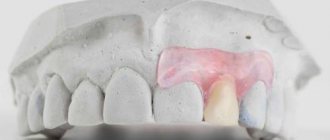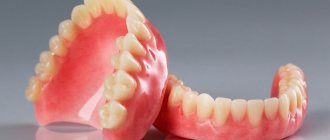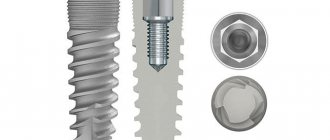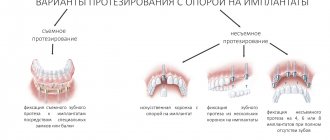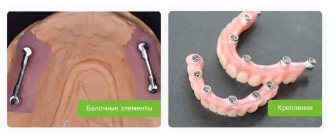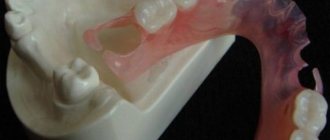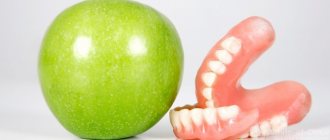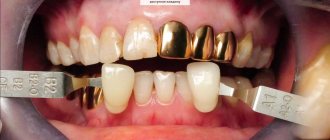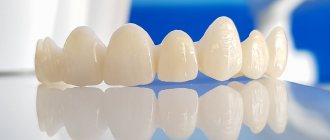Do you need prosthetics for 1 tooth? We will offer the best solution to the problem! We will select the appropriate method, carry out diagnostics and recovery procedures using modern equipment! At your service: a wide network of clinics in Moscow, many years of experience and a high level of professionalism. Make an appointment by number!
| Service | Price |
| Tooth restoration with a ceramic crown on zirconium oxide | from 23,000 rub. |
| Tooth restoration with a metal-ceramic crown | from 22500 rub. |
| Tooth restoration with a metal-ceramic crown Creation | from 18,000 rub. |
| Tooth restoration with a metal-ceramic crown of high aesthetics | from 16,000 rub. |
| Tooth restoration with a metal-ceramic crown of high aesthetics with shoulder mass | from 18,000 rub. |
| Tooth restoration with a metal-ceramic crown (Co-Cr) | from 15600 rub. |
| Tooth restoration with a metal-ceramic crown on precious metal | from 25,000 rub. |
To avoid possible misunderstandings, please clarify the cost of services in clinics with the administrator or during a consultation with a doctor. Prices on the website are not a public offer.
Sign up for a consultation
Types of prostheses
Prostheses differ from each other in the materials that are included in their composition and the fixing elements. Modern dentistry divides removable dentures into:
- acrylic;
- nylon;
- clasp
Acrylic or plate dentures have been used in dentistry for a long time. They are voluminous and rigid, but at the same time light and unnoticeable. Due to the lack of teeth to which the orthopedic structure can be attached, a plate is made that is installed using suction or using special glue. This type is considered the most accessible and widespread.
The load when chewing falls on the gums and leads to their atrophy. To avoid this (to transfer the load to the bone and not harm the gums), it is better to use removable dentures on implants.
Nylon removable dentures are made from safer and more modern materials. They are more aesthetically pleasing than acrylic ones and more comfortable (they do not injure the gums, do not cause allergic reactions and do not absorb odors). Resistant to bacteria that cause inflammation.
Due to their softness, the systems also lead to bone tissue atrophy over time and cause pain when chewing solid food. Nylon dentures cannot be repaired. Their price is 2-3 times higher than acrylic.
Clasp dentures are reliable and durable, but they are not used for complete prosthetics. These are structures with a metal frame; several crowns are attached to an arch and attached to adjacent teeth using attachments or clasps.
Such a prosthesis provides an even load when chewing, does not cause discomfort, and does not cause complications on the gums. It is made from several types of materials (zirconium, acrylic, plastic, metal ceramics). When deformed, dentures can be repaired. This is the most expensive removable design.
What problems can be avoided?
Let's consider what problems can be solved when using prosthetics with a removable orthopedic design:
- the aesthetics of the smile is restored,
- the gums in the area of the row defect (missing tooth) are protected from injury by hard pieces of food,
- bite relationships and occlusion are preserved: therefore, the antagonist (opposite from above or below) does not move down or up,
- neighboring teeth are not so overloaded during chewing,
- The teeth adjacent to the defect do not move: if you leave a “gap” in the row and do not perform prosthetics, then the “neighbors” on the right and left will gradually shift towards it. Thus, in the future it will be difficult to install a prosthesis or even have to wear a brace system.
How to choose the right dentures
A properly selected prosthesis can improve the quality of life, restore a beautiful smile and a healthy appearance.
In case of complete absence of teeth, removable dentures on implants restore chewing function well and provide uniform load. This design is securely fixed. A cheaper option is plate dentures with suction cups.
In case of complete edentia, nylon dentures are not recommended; they have low suction ability and are difficult to chew solid food in.
In case of partial absence of teeth, clasp dentures have proven themselves well. They are firmly attached and distribute the load evenly.
The choice of prosthesis for the upper and lower jaws has its own characteristics. You can choose any suitable option for the upper jaw; it lends itself well to prosthetics due to the large palate. It is better to install a prosthesis on implants or a clasp prosthesis on the lower jaw, since the sublingual space is small and the fixation is worse.
Removable dentures are a good budget option for dental restoration. They are easy to care for. They effectively cope with their function and look aesthetically pleasing. In practice, acrylic, clasp dentures, Acry-free, QuattroTi have proven themselves well.
Cost of dental restoration
How much does a denture cost for one tooth? In Moscow and the regions, the price of an immediate prosthesis averages 6000-7000 rubles, and a splinting clasp prosthesis costs from 60 thousand rubles. Also, before prosthetics, it is necessary to undergo the removal of tartar and plaque, treatment of existing caries, pulpitis, stomatitis - all these procedures are paid separately.
[1] Abolmasov N.G. Orthopedic dentistry, 2002.
Author: Sambuev B. S. (Thank you for your help in writing the article and the information provided)
Which denture is best for missing teeth?
Which orthopedic design is best used will depend on the individual characteristics of the patient and the number of remaining teeth.
For example, on the upper jaw, plastic dentures are fixed quite well. It will be impossible to fix it well on the lower jaw if mini-implants are not installed under the prosthesis.
If there is a complete absence of teeth in the upper jaw, it is better to choose a prosthesis made of acrylic, since due to the high elasticity of nylon there will be no suction effect.
Dentures made of plastic are more comfortable and effective when chewing than nylon ones, but nylon ones are thinner and lighter. They have better aesthetics in comparison with plastic and clasp ones, because the clasps of a nylon prosthesis are made of pink nylon, and the clasp ones are made of metal. However, clasps are easier to get used to and their service life is longer.
Rules for care and wearing
How to wear a mono-prosthesis? Removable “butterflies” require regular removal - after each meal or even eating thick yogurt, the orthopedic structure will have to be removed from the mouth and washed in water. There is no need to remove the splinting “clasps” every day; by the way, this can even be dangerous, because there is a risk of severe loosening. With any denture option, you will have to carefully observe oral hygiene - brush and paste twice a day, and soak the denture in a disinfectant solution once a week. You will have to visit the dentist approximately 1-2 times a year for examination and relocation of the structure, because... due to bone atrophy, the fit of the base becomes less dense.
Dietary recommendations limit and even prohibit the consumption of hard foods - chunky hard meat, fresh hard vegetables and fruits (you have to grate them first), toffees and toffees. Therefore, the “butterflies” are weakly fixed and can fly off, and the teeth under the splinting clasps can become very loose.
Which material is better and will last longer?
The degree of reliability of fixation, comfort and aesthetics during use depends on the material from which removable dentures are made.
The main requirements for them include:
- strength;
- biocompatibility with human tissues;
- lack of toxicity, allergenicity, effects on taste and olfactory receptors.
Acrylic is the most popular and affordable material. It does not change its properties over time; acrylic dentures have good aesthetics. But it has a porous structure and can accumulate bacteria that cause inflammation.
Nylon is a lightweight and flexible material. Does not cause an allergic reaction and does not accumulate bacteria. Although it is durable, due to its softness and elasticity it quickly becomes unusable, so nylon dentures perform a good aesthetic function, but do not cope well with their intended purpose, chewing.
Acry Free is a modern material for removable dentures (translucent plastic that does not contain acrylic). It is elastic, does not injure the mucous membrane, and structures made from it are resistant to mechanical stress. This material is suitable for patients with allergies to metal or acrylic and with hypertonicity of the masticatory muscles. The service life of dentures made from it is longer than that of acrylic ones. The cost is higher than acrylic and lower than nylon and clasp.
Which option to choose among removable ones?
Which prosthesis[1] should I put on one tooth? It is recommended to select the best option individually, together with an orthopedic dentist. If the speed of prosthetics is important, and the supporting teeth do not have pathological mobility, then it is better to choose a “butterfly” made of acrylic or “Acry-free” for the chewing part of the row. Nylon, of course, is comfortable, but for a very short time, and a stretched product will have to be changed soon. In the presence of pathological mobility, only the splinting clasp remains.
But do not forget that all the options considered are recommended for temporary use only. They are not very securely fixed (especially in the “smile zone”, where the supporting crowns are not so wide) and do not stop bone tissue atrophy. Therefore, it is better to turn to alternatives.
“I wore a bow tie during pregnancy until I could get an implant. It’s not very convenient, and you have to constantly clean it. But I was afraid that without a prosthesis, neighbors would move towards each other, and I would generally suffer later. I was afraid that it would fall out while eating and I would swallow it. Therefore, I had to chew very carefully.”
Olga R., review from baby.ru
How much do the best dentures cost?
| Name | Cost, rub.) |
| Dental prosthetics with a complete removable plate denture | from 20,000 to 31,000 |
| Dental prosthetics with a complete removable plate denture made of nylon | from 50 000 |
| Dental prosthetics with a complete removable thermoplate denture Acry Free | from 49,000 to 55,000 |
| Prosthetics with removable clasp prosthesis | from 49,500 to 115,000 |
Prosthetics at the clinic "PRESIDENT"
In our clinic you can quickly and effectively restore any number of teeth using advanced equipment and innovative techniques.
We work with leading implants: Implantium, Ankylos, Astra-Tech, Straumann.
Each procedure is preceded by diagnostics (computed radiography and tomography), which eliminates the risk of complications and allows you to choose the optimal method, taking into account the anatomical features and physical condition of the patient.
We offer the most modern and proven recovery procedures:
- prosthetics with implants produced in Israel, Switzerland, Germany, South Korea, Sweden;
- instant implantation – allows you to restore the integrity of the dentition in just one day;
- prosthetics using metal-free ceramic crowns;
- installation of a prosthesis with a crown made of zirconium dioxide or metal ceramics;
- partial removable prosthetics;
- installation of temporary prostheses.
The procedure is as comfortable as possible, without pain or inconvenience. The installed dentures have an attractive appearance and perfectly imitate natural tissues, looking aesthetically pleasing and natural. And you can use them on the day of installation.
Don’t give up your usual lifestyle, don’t hold back your smile, just call and make an appointment at one of our clinics in Moscow!
Benefits for use
Long-term absence of teeth can lead to various dental problems. Removable dentures allow you to avoid the following:
- Displacement of adjacent teeth in a row towards the defect. This is a slow process that leads to changes in the bite. The defect accelerates when a person begins to chew food on one side of the jaw.
- Increased load on remaining teeth. The jaw quickly adapts to changing conditions. This is manifested by the reformation of functional groups in the mouth. Such repurposing leads to increased abrasion of the enamel and destruction of fillings.
- Moving the antagonist tooth towards the defect. The tooth seems to increase in size. In fact, there is no growth. It simply slides out of its own hole, since there is less load on it.
- Excessive load on the temporomandibular joint. This occurs due to changes in the bite. As a result, the TMJ becomes deformed. The patient experiences pain while chewing and difficulty opening the mouth.
- Changes in the tone of the jaw muscles. A person cannot chew food normally. It enters the stomach in large pieces, which leads to problems with the gastrointestinal tract.
One cannot help but mention psychological problems. Temporary dentures allow you to quickly restore the aesthetics of your smile. This means that the patient will not feel awkward when communicating with other people.
Installation steps
Installation of removable dentures includes several stages:
- Examination. A mandatory procedure, without which it is impossible to imagine the installation of a dental structure. During the examination, the doctor determines the condition of the oral cavity, the presence of possible diseases and defects, and chooses which prosthetics is more reasonable - complete or partial, and the type of design.
— Treatment (if necessary). So that the patient does not have to get rid of diseases after installation of the prosthesis, all therapeutic measures should be carried out in advance. In addition, various pathological processes in the oral cavity sharply reduce the service life of the prosthesis.
— Preparation for prosthetics. To determine the shape of the gums, the doctor makes an impression of the jaws using a special mass. These casts will then be used to make prosthetics that best match your anatomical features.
— Checking the structure in the oral cavity. This is a kind of fitting when the doctor evaluates how suitable the manufactured prosthesis is for you. At this stage it can be adjusted and made comfortable to wear.
- Installation. Fixation of the prosthesis in the oral cavity.
Production and installation of partial removable dentures
In all cases, a preparatory stage is required: examination of the oral cavity, elimination of dental problems, professional cleaning of existing teeth; Abutment teeth are prepared for the installation of locking clasp dentures. After this, they move on to the manufacturing process:
- An impression is taken to create a dummy jaw.
- A precise prosthesis is made from selected materials.
- They do a series of fittings and adjustments.
- The structure is finally installed in the oral cavity and an informational conversation is held on how to care for the product.
Temporary prostheses (immediators) are created in 2-3 days (production is possible on the day of application). For permanent systems it will take much longer - up to 3 weeks or more (especially complex structures).
Life time
Such a prosthesis can last from 2 months to 2 years. The service life depends on the needs of the patient, the materials used in the manufacture and the design features of a particular model.
Plastic products equipped with metal fasteners last the longest. Nylon and acrylic butterflies are not as durable due to the insufficient strength of the materials.
It is worth understanding that any prosthesis will sooner or later become unusable. They crack and begin to wobble. This can lead to injury to the jaw, so at the first sign of defects you should consult a specialist.
You can increase the service life of the product with proper care. This involves regularly cleaning your dentures with a soft brush and toothpaste. At night it is better to remove it and place it in a special container with an antiseptic. A disinfectant solution can be purchased at a pharmacy or made independently using special tablets. The antiseptic in the container must be changed regularly.
You should not remove your denture too often. This can lead to displacement of the clasps, which will cause discomfort when wearing the product.
What is better - an implant or a bridge?
If there are no contraindications to the operation, and you are satisfied with the price category, then if one or two teeth are missing, you can safely place an implant. The service life of the structure is long, there is no impact on neighboring units.
But modern materials and technologies make it possible to manufacture and install high-quality bridges with minimal grinding of the supporting teeth. This method of prosthetics is cheaper and quite aesthetic. If you follow the operating rules, take care and perform regular hygiene procedures, the product will last up to 10 years.
Advantages of dental bridges:
- There is no healing period.
- Fast production.
- The usual load is immediately allowed.
- There is no replacement of temporary crowns with permanent ones; the bridge is a single structure.
- Visually almost invisible.
An additional advantage: the bridge can be selected from different price categories. Disadvantages – the need to grind adjacent teeth, increasing the load on them. You can put a bridge on one tooth - a single crown with fiberglass fastenings on the supporting units.
